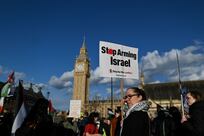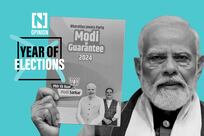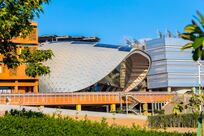Raytheon is scouring Abu Dhabi's business community for partners to help it provide light manufacturing facilities, maintenance and training for its multibillion-dollar Patriot missile defence programme for the UAE. The Massachusetts-based aerospace and defence contractor is in the implementation phase of an order made in December 2008 by the UAE for the GEM-T and PAC-3 missile defence systems.
The deals so far are worth more than US$5 billion (Dh18.36bn) over the life of the contract and include spare parts, training and other services as the UAE joins its Gulf neighbours in aiming to builda credible air and missile defence shield against potential threats. On the PAC-3 rocket, Raytheon provides the radar system while the missile is made by Lockheed Martin, its US competitor, in a pact that in the defence business is dubbed "competi-mates".
"If we build systems it is always good to have some indigenous work in the country," said Karen Kalil-Brown, the vice president of national and theatre security programmes for Raytheon Integrated Defence Systems. "That is the interest here - to establish a supply chain." Raytheon has consolidated its presence in Abu Dhabi with a central office at Mohammed Bin Zayed City on the Abu Dhabi mainland and hosted an "open house" for the Government and potential industry partners this week.
Abu Dhabi, in particular Mubadala Development, a strategic investment company owned by the Abu Dhabi Government, is keen to develop a home-grown and high-tech aerospace manufacturing industry in the emirate. But Raytheon's interest is on more basic, "bended metal" work for the equipment and vehicles that support the missiles themselves, Ms Kalil-Brown said. The work they could look to partner with local industry includes the missile launchers and the accompanying electronics, cables and wiring and communications equipment, as well as generators and vehicles to tow the launchers, she said. The programme could also see Raytheon join local companies to help it carry out maintenance and training on the system.
Raytheon plans to make first deliveries of the Patriot missiles in the summer of 2012. The warheads will gradually replace the UAE's battery of Hawk defensive missiles purchased in the late 1980s, also manufactured by Raytheon. The GCC and its ally, the US, have assembled various versions of American missile defence technology in the Gulf, including Hawk missiles, varying generations of the Patriot system and the Aegis seaborne system. Creating an integrated air defence and missile defence system between the countries was the subject of a conference that took place in the UAE capital this week.
In December 2008, the UAE became the first Middle East customer to purchase the PAC-3 missile system in what could be contracts worth $1.8bn over the life of the UAE programme, according to Lockheed Martin. That same month, Raytheon announced the sale of hundreds of its GEM-T missiles to the UAE worth $3.3bn. The Emirates is also approved by the US to become the first international customer outside America to purchase the Terminal High Altitude Area Defence (THAAD) missile system under development by Lockheed Martin, with the radar again provided by Raytheon. That contract could be worth as much as $7bn. The THAAD system carries no warhead but relies on the kinetic energy of the impact to take out targets up to an altitude of 150km.
igale@thenational.ae





